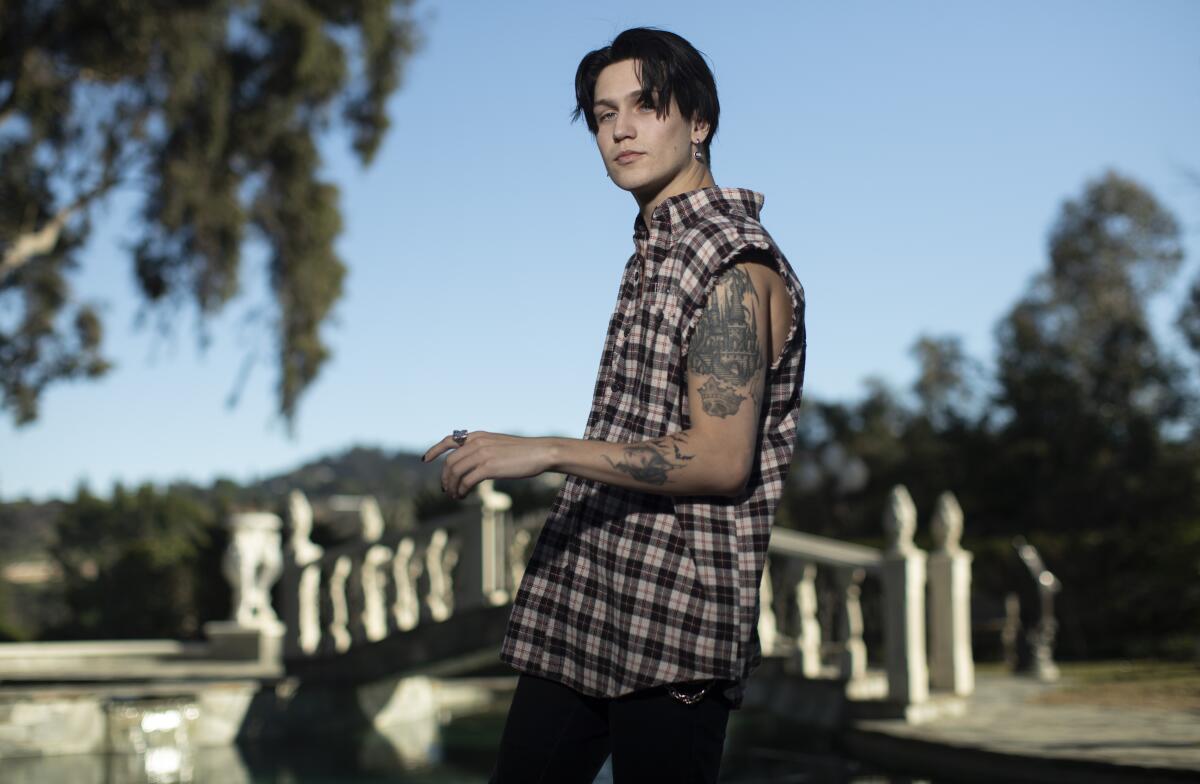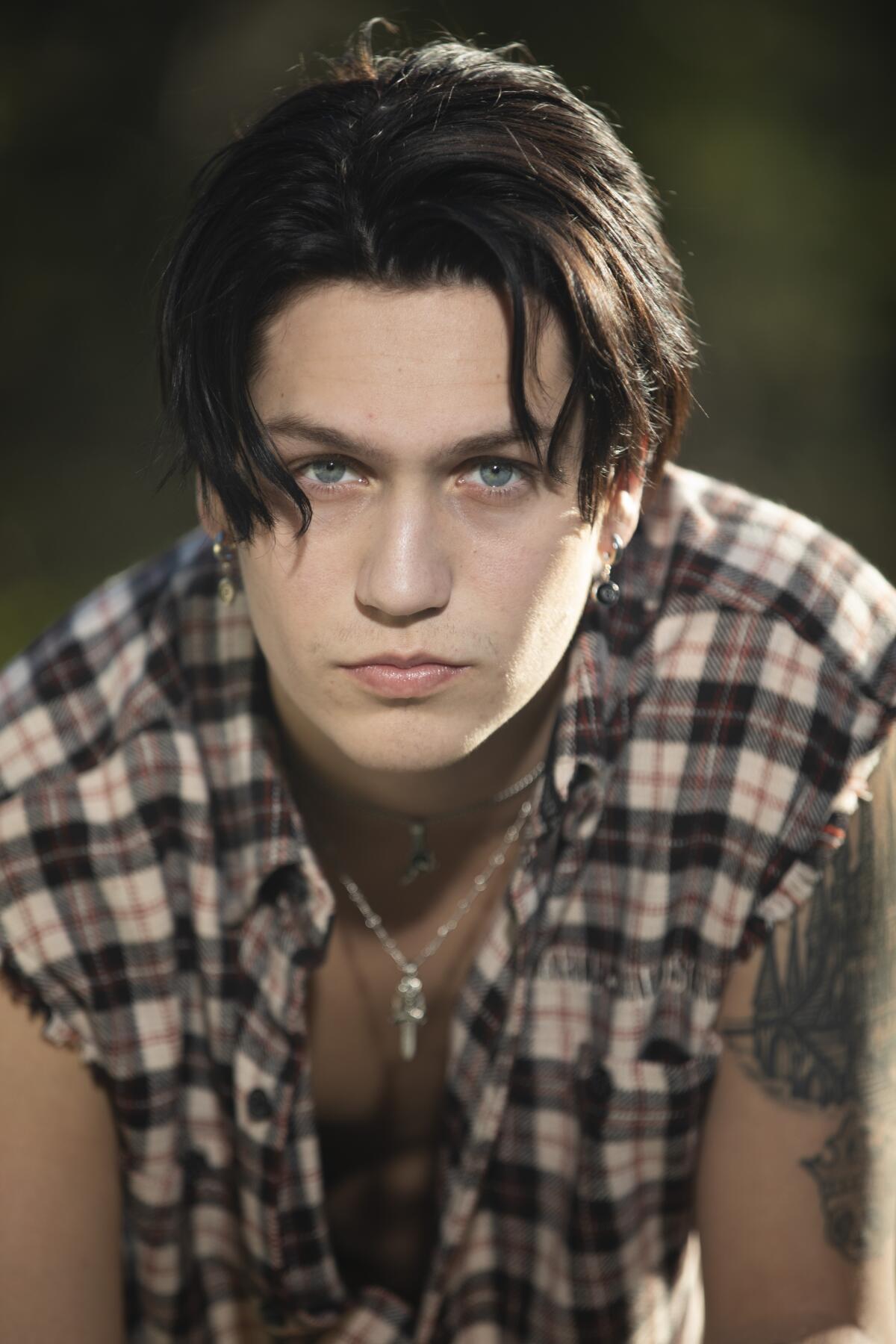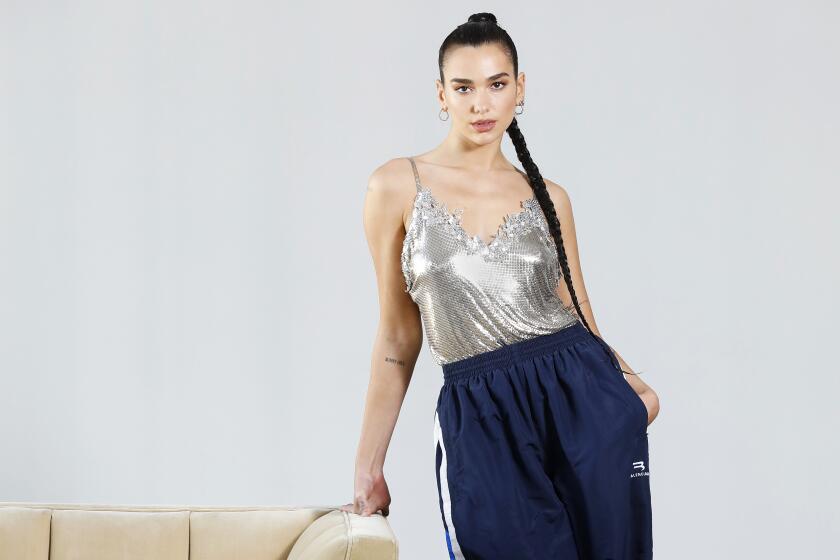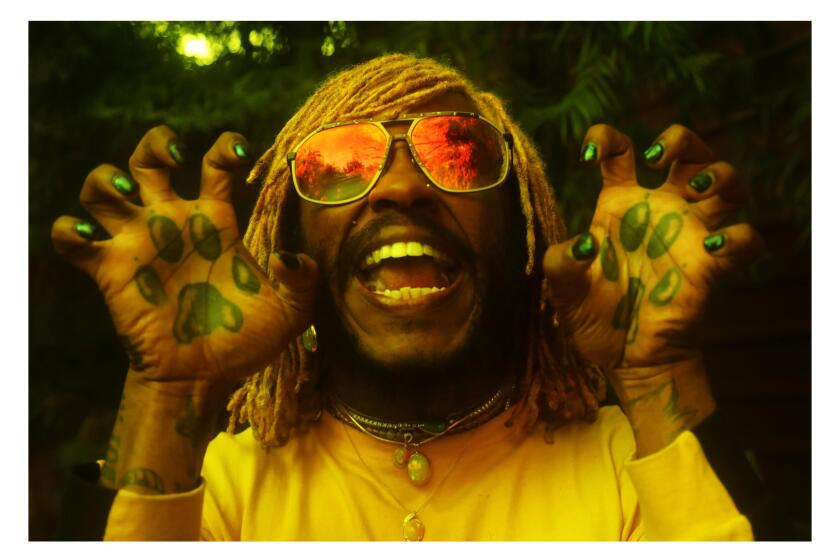How Chase Hudson, TikTok heartthrob, became Lil Huddy, snarling pop-punk rocker

Chase Hudson first became internet-famous as a pouty teen heartthrob with the online handle Lil Huddy, lip-syncing and dancing on Musical.ly, then eventually TikTok, to anything from Top 40 radio to Soundcloud rap.
That was, like, ages ago. Today, Lil Huddy is a snarling singer-guitarist with his own radio-ready songs, following in the footsteps of his longtime idols — tattooed priests of pop-punk like Machine Gun Kelly, Blink-182 and My Chemical Romance.
At 18, Hudson counts nearly 30 million followers and over 1 billion views on TikTok, where he’s been building an empire since he was 12. In 2019, he co-founded Hype House, the now-infamous mansion in Los Angeles that’s home to a collective of young TikTok personalities, who cohabitate and produce videos together around the clock. Hype House alumni include teen super-influencers — such as Thomas Petrou, Charli and Dixie D’Amelio, and Addison Rae — who would volley among one another’s TikTok channels, performing lip-syncs and dance challenges and racking up lucrative sponsorship deals.
Dua Lipa is nominated for six Grammy Awards, second only to Beyoncé. But unlike the music of many of her chart peers, her songs resist a closely personal read.
But after members of Hype House experienced both pandemic fatigue and a residual fallout in the summer of 2020 — hallmarked by Hudson’s extremely public breakup with the most-followed user on TikTok, 16-year-old dancer Charli D’Amelio — Hudson has since settled into his own house, decked with classical columns, Rococo-style statuettes of cherubs and a bridge crowning his swimming pool.
There, Hudson gets to back-burner the impish smile that first won the hearts of his young fans and further explore his shadow side, beyond the blue-black locks, dragon tattoos and matching nail polish that came to define his cyber alternative “e-boy” aesthetic. In January he released “21st Century Vampire,” a fuzz-rock ballad with a steel-toed kick; in the video, Hudson emerges from the darkness in leather-clad, smoky-eyed glory.
“I’m not afraid to die / I’ll make your boyfriend cry,” he sings. “I’m howling at the mooooon!”
“You’re waking up every day and you’re just making videos and more videos,” he says, reflecting on his time at Hype House. He phones in via Zoom call from his bedroom, which is littered with high-end sneakers and Pokémon memorabilia. “That’s how quarantine f— people up the most,” he says. “By repeating the same cycle every day. I was having a whole identity crisis until I found myself through music. Now I’m, like, bouncing off the walls.”

His big break from the TikTok life came when he was cast in the 2021 film “Downfalls High,” a companion to Machine Gun Kelly’s 2020 chart-topping pop-punk album, “Tickets to My Downfall.” Hudson stars as a gawky punk teen named Fenix, who catches the discerning eye of an archetypal popular girl, Scarlett, played by “Euphoria” star Sydney Sweeney. The movie sees Fenix pushed around and negged by his jock nemesis — played by the TikTok star turned emo-rapper Jxdn, aka Jaden Hossler — until Fenix’s garage band makes an impressive debut at a local dive bar, earning him the respect of his peers.
“I was six months deep in the studio, writing demos and finding my sound,” says Hudson. The role “was just right for me.”
Hudson is far from the only TikTok star who’s sought to parlay insta-fame into a music career. In 2020, Jxdn penned a deal with Blink-182 drummer Travis Barker’s DTA Records, while Dixie D’Amelio signed to L.A. Reid’s HitCo Entertainment and Nessa Barrett to Warner Records. Music manager Adam Mersel, who served as right-hand man to hitmakers Bebe Rexha, Sara Bareilles and Ben Platt, discovered Hudson through his 14-year-old cousin, who was an avid follower of TikTok’s varsity league of creators.
“Huddy’s management team introduced me to him in December, when this TikTok craze was kicking off,” says Mersel. “My cousin was basically like, ‘You’d be crazy not to meet him!’”
Longtime friends and collaborators Thundercat and Flying Lotus are each nominated for a Grammy Award for ‘It Is What It Is,’ an album marked by loss.
Mersel had recently founded Immersive Records, a subsidiary of Interscope Geffen A&M Records. In the same week that “Downfalls High” first dropped, Lil Huddy became Mersel’s first signing — despite the fact that he only had a few scrappy demos to his name. “He is a student of pop-punk,” says Mersel. “But he comes from mainstream pop culture. So to establish him as a credible pop-punk artist, he’s gotta earn it. We have to earn the trust of the community around it.”

Hudson’s timing couldn’t be better. In September 2020, Machine Gun Kelly’s “Tickets to My Downfall” surprised many when it debuted at No. 1 on the Billboard 200 — the first rock album to top the chart since Tool’s “Fear Inoculum” in 2019. Meanwhile, hip-hop artists like Lil Uzi Vert, Lil Peep and Juice Wrld inspired a reappraisal of emo in the mainstream. In pop music, Halsey enjoyed multiple collaborations with metalcore act Bring Me the Horizon, and Miley Cyrus called on punk icons Joan Jett and Billy Idol to feature on her 2020 album, “Plastic Hearts.”
“It’s just the raw emotion of it that people [connect] with,” says Hudson of the alt-rock renaissance. “You can’t sleep on it.”
“Every generation of the genre takes the foundation that the previous generation built and makes it their own,” says Nick Long, who contributed to “Downfall” as co-writer and guitarist and is now executive producer of Lil Huddy’s debut album, which comes out this summer. Long’s repertoire includes tracks by All Time Low, Papa Roach and Black Veil Brides. “The most authentic thing about Chase, as an artist, is how stoked he is to be making music, [like] I was at 18.”
Due to the COVID-19 pandemic, Hudson will forgo the thankless task of workshopping his songs at grungy basement shows, or blazing through summer festivals like Warped Tour, as Long once did. Hudson has never performed with a band live on stage, and may not get the chance to for some time. Like many other aspiring rock stars in 2021, he’s left to practice his guitar chops in quarantine until it’s safe to gather in public again.
“I don’t know when, but I want to be able to play live someday,” says Hudson. “Where I grew up, nobody was woke to playing in bands.”
Hudson grew up in Stockton, a one-time commercial hub during California’s gold rush that took an economic nosedive following the 2008 recession. The son of two schoolteachers, Hudson was raised on a steady diet of classic rock and pop country; he attended his first concert at the age of 12, where he saw Dan and Shay open for Blake Shelton.
The sensitive kid brother to his two older sisters, Hudson credits them for introducing him to Blink-182, My Chemical Romance and Fall Out Boy. (“I used to steal my sister’s iPod Nano when she was at cheerleading practice,” he says.) Hudson, unable to command his own voice during puberty, resorted to lip-syncing his favorite songs on the app Musical.ly, then TikTok, until he could eventually sing them by himself — a somewhat recent development. “It took me a while, but I’ve found my own voice now.”
As Hudson entered high school, he explains, his growing visibility on the internet made it near-impossible to attend school like his peers. He says the breaking point came at 14, when he was bullied so badly that he suffered nightmares and suicidal ideations. At 15, he began an accelerated online learning course, which helped him graduate before he turned 17.
“People would make fun of me for being skinny, being the Musical.ly kid, caring about my style,” he says, tugging on the sleeves of his hoodie. “When I switched to online school, my skin cleared up, I started getting good sleep; it was a total 180. My parents noticed right off the bat.”

Recalling the emo yawp of his faves, Hudson narrates the turmoil of his teen years on singles such as “Vampire” and “The Eulogy of You and Me” — a pop-punk earworm with a venomous bite, produced by Long and Travis Barker. “Here lies all of the lies,” Hudson snarls, “And all of the pain that I buried inside.”
“What I’m putting out is straight emotional as hell,” he says.
Hudson is well aware that the main takeaway for many of his fans will be the gossip — namely, his theatrical breakup with D’Amelio, which unfolded in real time over a series of back-and-forths on TikTok and Twitter. Rumors of Hudson cheating on D’Amelio proliferated across the internet, and Hudson fired back at angry fans with a bombshell drop of alleged offenses committed by other TikTok stars.
“There was a moment everyone was beefing, but it was short-lived,” Hudson clarifies. In his songs, he says, “I’m not writing about one girl, or one relationship. ... It’s all of the people, things that have broken me and made me who I am today. I’m finally releasing feelings I’ve kept inside for years.”
Despite all the drama surrounding Hype House, it kept those millions of eyes fixed on Hudson, as well as on his former roommates — who have all since buried the hatchet and gone back to broadcasting their “family” dinners and goofy makeup tutorials.
“The internet makes it easier to further your own career,” says Michael Gruen, founder of TalentX, a management firm run by and for creators on TikTok and YouTube. “It’s hard to be forgotten when you’re popping up in other people’s content, so you have to create a critical mass. You know when you have a crush on someone but lose interest after 10 days? You have to think of it the same way, use the same appeal. Keep striking while the iron is hot, and don’t let people forget about you. That’s how you keep yourself alive.”
Still, Hudson cautions against putting all of yourself into the web — as a public personality, as an artist, or just as a teen.
“I was kind of lost,” says Hudson, recounting his year in quarantine. “The internet [can be] really weird and twisted. I looked like a little kid last summer. Now I’m becoming healthier, working out constantly and shaping into more of a man than a kid.
“There will always be people who want to look into you, and people who don’t,” he adds. “I can live with that now.”
More to Read
The biggest entertainment stories
Get our big stories about Hollywood, film, television, music, arts, culture and more right in your inbox as soon as they publish.
You may occasionally receive promotional content from the Los Angeles Times.













